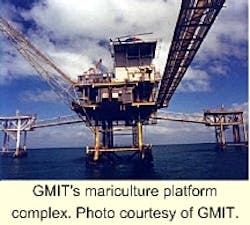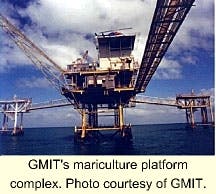Mariculture's oily battleground
Nonprofit research firm Gulf Marine Institute of Technology (GMIT) may have a long, difficult battle ahead before its plan to research and raise native finfish within their natural Gulf of Mexico environment is realized. The Gulf Breeze, Fla.-based researcher's top priority as of late is not its maricultural-or deep ocean-fish farm project, but to fend off Commis- sioner David Dewhurst of the Texas General Land Office (GLO) from moving in to demand the dismantlement of GMIT's mariculture platform complex that has been fully permitted by the Army Corps of Engineers to convert the site into one of the first offshore fish farm projects in US waters.
The unfolding drama may set a precedent for future efforts to obtain leases for such projects involving reassigned offshore oil and gas structures and leases. It also plays out against a backdrop of mounting global concerns over the alarming decline of natural fisheries and over the massive wave of offshore facilities abandonment looming in the coming decade. It is this latter issue where the Gulf of Mexico has already established pioneering credentials with its "rigs-to-reefs" program.
Background
In September 1998, GMIT received approval from then-GLO Commissioner Garry Mauro to use the 500-acre, four-platform complex on state tract 526L, 10 miles southeast of Matagorda Peninsula-the first ever to be donated to research-for its maricultural project, said John Ericsson, GMIT president.
But, in May 1999, Ericsson received word from Mauro's successor, Commissioner David Dewhurst, that GMIT's research proposal did not prove that it would be an "unqualified financial success," Ericsson said. In a letter sent to Sen. Kay Bailey Hutchinson, Dewhurst wrote that Ericsson "could not produce the assurances necessary to eliminate [GLO's] concerns about the financial feasibility of the venture." In Ericsson's opinion, there would be no way for a proposed project-of any type-to generate that kind of proof.
Another setback for GMIT's proposal was unveiled in an affidavit filed by Mauro in support of the research firm's efforts. Mauro noted that, despite his written approval of the proposed project, his office staff had failed to develop a form for a surface lease agreement for an offshore maricultural lease, "since this was one of the first projects of this type and magnitude." Mauro had assumed that the paperwork would be filed. He later left office to campaign against George W. Bush for governor of Texas.
Meanwhile, GMIT was notified in October 1999 that the former lease had terminated in July, when its wells were plugged. GMIT was then ordered to dismantle the platforms within 120 days of the July date. The deadline for removal of the platform has been extended frequently since that time, and GMIT in mid-May went to court for a temporary restraining order to block GLO from dismantling the complex (OGJ Online, May 18, 2000); a trial date of Nov. 20 has been reset.
For more than 5 years, GMIT has been working toward acquiring the necessary funds, permits, and platform site for its program. GMIT posted a $2.6 million bond to guarantee the GLO for the ultimate removal cost of the $5.2 million platform complex as GMIT accepted the platforms, which were donated to the firm by Seagull Energy E&P Inc. (now Ocean Energy Corp.). This bond sum, Ericsson assures, is considerably higher than that required for comparable performance bonds required of oil and gas companies operating in Texas waters.
GLO was contacted by OGJ but declined comment, citing the pending litigation.
Industry precedence
Backers for GMIT's maricultural project were not difficult to find. A letter sent to Dewhurst by Thomas Campbell-former General Counsel to the National Oceanic and Atmospheric Administration under Pres. George Bush's administration-called the development of such a complex a "tremendous opportunity" for the state of Texas.
Campbell explained that similar projects in countries such as Japan receive government investment for nurturing the mariculture industry. In fact, GMIT's Ericsson claims that Japan has invested $2 billion in the construction of artificial structures off its coasts for harvesting fish.
"Offshore mariculture and offshore oil are complimentary," Campbell writes. The fostering of such efforts on used platforms, says Campbell, would "turn current liability for the oil and gas industry into an asset. If one offshore mariculture venture is successful, then the business model will be established, and others will follow."

